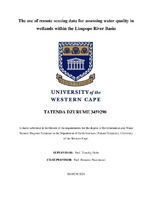| dc.contributor.advisor | Dube, Timothy | |
| dc.contributor.advisor | Mazvimavi, Dominic | |
| dc.contributor.author | Dzurume, Tatenda | |
| dc.date.accessioned | 2021-03-17T08:27:53Z | |
| dc.date.available | 2021-03-17T08:27:53Z | |
| dc.date.issued | 2021 | |
| dc.identifier.uri | http://hdl.handle.net/11394/7986 | |
| dc.description | >Magister Scientiae - MSc | en_US |
| dc.description.abstract | Wetlands are unique ecosystems that are acknowledged among the world’s most productive and valuable ecosystems. They are recognized as being essential to sustainable development and human welfare due to their unique environmental and socio-economic value. These highly productive ecosystems provide functions such as recycling of nutrients, watershed protection and flood control as well as grazing resources. Wetlands provide the basis for human livelihoods in Africa through ecosystem services. However, these ecosystems are affected by internal and external factors within and outside their catchments, hence the importance of monitoring those changes around these wetlands. | en_US |
| dc.language.iso | en | en_US |
| dc.publisher | University of the Western Cape | en_US |
| dc.subject | Chlorophyll-a | en_US |
| dc.subject | Land cover dynamics | en_US |
| dc.subject | Protected wetlands | en_US |
| dc.subject | Remote sensing | en_US |
| dc.subject | Southern African transfrontier river Basin | en_US |
| dc.title | The use of remote sensing data for assessing water quality in wetlands within the Limpopo River Basin | en_US |
| dc.rights.holder | University of the Western Cape | en_US |

